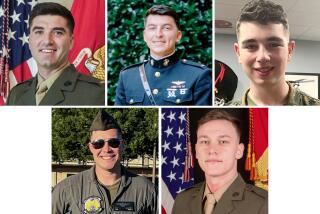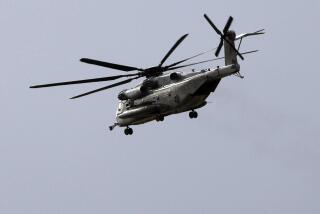Marine Snipers Ready to Shoot to Kill in Iraq
- Share via
CAMP MATILDA, Kuwait — For most of the Marines here, the opening of a war against the Iraqi army would be called G-day, for ground offensive.
But for Sgt. Ken Sutherby and Cpl. Cameron Gingras, it could be called the opening of hunting season. Their specialty -- one of the most difficult and misunderstood in the military -- could be key to a battle for Baghdad.
Sutherby and Gingras are snipers, trained to stalk their prey for miles, wait for hours, even days, and then kill the enemy with a single shot using a bolt-action rifle from up to 1,000 yards away.
“We engage in selective targeting,” Gingras said.
In the centuries that armies have been using snipers, particular targets have been high-ranking enemy officers. Also sentries. And soldiers foolish enough to light a cigarette at night or venture away from their camp.
A sniper motto advises, “One shot, one kill.” Another suggests, “Don’t run -- you’ll just die tired.”
If their target is fleeing in a vehicle, Sutherby and Gingras have a second rifle loaded with .50-caliber armor-piercing ammunition. One shot from a mile away can explode the gas tank and engulf the vehicle, and the target, in flames.
Almost all urban warfare has included many snipers, according to members of the 1st Reconnaissance Battalion, part of the 1st Marine Division.
Working with a spotter, a sniper aims to harass, intimidate and demoralize the enemy and deny him the opportunity to regroup and organize, making him afraid to venture into the open or even to sleep.
With morale in the Iraqi army thought to be shaky, a few well-timed sniper kills might prove to be the incentive needed to spark a mass surrender, Marines say.
For all its difficulty and danger -- the Viet Cong put a bounty on the head of U.S. snipers -- sniping also provides a sense of individuality often lost in a military unit.
“It’s very independent work,” Sutherby said. “The Marine Corps is very strict. I won’t say it’s micro-managed, but they maintain discipline. As a sniper, you get the independence to make your own call, the freedom to get the job done.”
At sniper schools at Camp Pendleton and in Quantico, Va., Marines are taught the skills of stealth and cunning. The washout rate is high. Along with stalking practice, snipers need to improve their memories and learn to catalog clues about the behavior of their quarry.
Sniper school students are sometimes given a minute or two to look at objects scattered in a room. Hours, maybe days, later, they are asked to describe the objects and their locations or some other such information.
In one exercise, students were given two minutes to examine tiny objects near a computer screen. On the screen, an X-rated movie was in progress.
“It was a major distraction for the guys,” Gingras said.
There are two dozen snipers in the reconnaissance unit, which also provides behind-the-lines intelligence. The Army and the British Royal Marines also have snipers in Kuwait.
Sutherby, 39, joined the Air Force when he graduated from high school. It wasn’t a good fit. His drill sergeant -- a former Marine -- filled him with tales of Marines and combat.
Sutherby left the Air Force after eight months. His quest to get into the Marine Corps stalled. The Air Force had saddled his discharge papers with “bad numbers,” which can denote a discipline problem.
“I guess I made somebody mad,” he said. He finally joined the corps in 1985 and served until 1989. He then spent 10 years as a bodyguard, with clients including rich Saudi families in the Beverly Hills area.
With a new wife -- and three stepchildren -- he decided to rejoin the corps in 1999 and get back into the reconnaissance field.
Gingras, 25, studied material science engineering at the University of Arizona for three years before enlisting. After a tour in Okinawa as an infantry officer, he volunteered for reconnaissance duty.
“I love it,” he said.
But not everyone shares the men’s love of their duty.
Sutherby’s mother, who lives in Ann Arbor, Mich., disapproves of her son’s military specialty.
“She’s very liberal and very anti-gun,” Sutherby said. “She wouldn’t allow even toy guns in the house. She’s scratching her head saying, ‘How did he turn out like this?’ ”
Gingras, who grew up in a suburb of Philadelphia, said that his family is supportive of his choice but that he has found civilians puzzled and even hostile.
“I’ve gotten tired of defending my job to civilians,” he said. “They seem to think we’re assassins. They don’t understand the military significance.”
More to Read
Sign up for Essential California
The most important California stories and recommendations in your inbox every morning.
You may occasionally receive promotional content from the Los Angeles Times.













